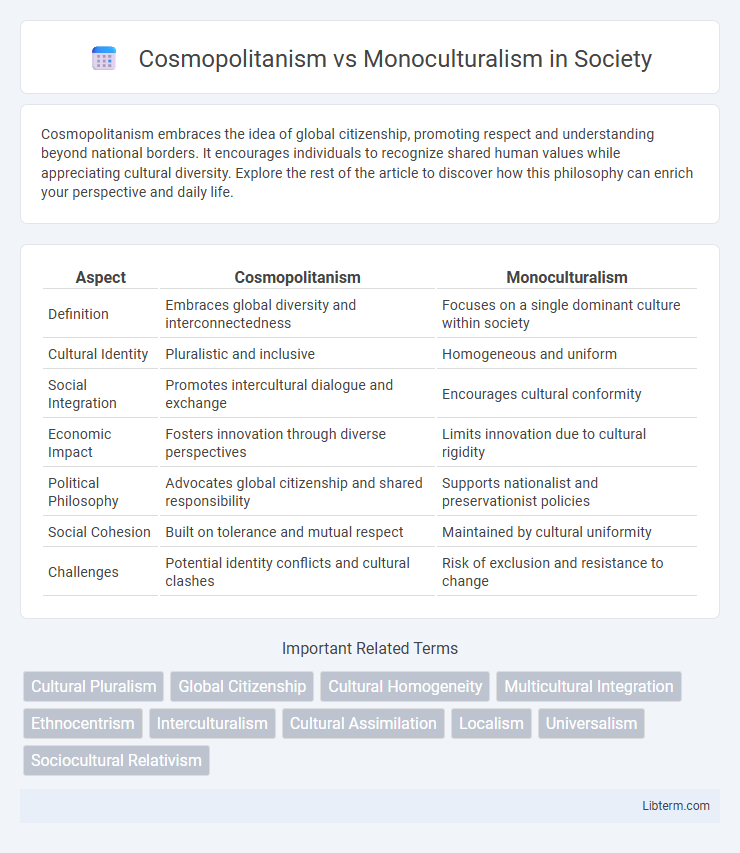Cosmopolitanism embraces the idea of global citizenship, promoting respect and understanding beyond national borders. It encourages individuals to recognize shared human values while appreciating cultural diversity. Explore the rest of the article to discover how this philosophy can enrich your perspective and daily life.
Table of Comparison
| Aspect | Cosmopolitanism | Monoculturalism |
|---|---|---|
| Definition | Embraces global diversity and interconnectedness | Focuses on a single dominant culture within society |
| Cultural Identity | Pluralistic and inclusive | Homogeneous and uniform |
| Social Integration | Promotes intercultural dialogue and exchange | Encourages cultural conformity |
| Economic Impact | Fosters innovation through diverse perspectives | Limits innovation due to cultural rigidity |
| Political Philosophy | Advocates global citizenship and shared responsibility | Supports nationalist and preservationist policies |
| Social Cohesion | Built on tolerance and mutual respect | Maintained by cultural uniformity |
| Challenges | Potential identity conflicts and cultural clashes | Risk of exclusion and resistance to change |
Understanding Cosmopolitanism: A Global Perspective
Cosmopolitanism embraces the idea of global citizenship, promoting cultural diversity and interconnectedness across nations while fostering respect for different identities and beliefs. It supports the exchange of ideas, values, and traditions to create inclusive societies that transcend national and ethnic boundaries. This global perspective encourages cooperation and empathy among individuals, enhancing social cohesion in an increasingly interconnected world.
Defining Monoculturalism: Roots and Characteristics
Monoculturalism emphasizes the preservation of a single, dominant cultural identity within a society, often rooted in historical traditions and shared ethnic or national heritage. This approach prioritizes cultural homogeneity, limiting diversity by favoring uniform customs, language, and values. Characteristics include resistance to multicultural influences, strong nationalistic sentiments, and policies that support cultural assimilation or exclusion of minority groups.
Key Differences Between Cosmopolitanism and Monoculturalism
Cosmopolitanism advocates for embracing global cultures, promoting diversity, and fostering interconnectedness among varied ethnic and cultural groups. Monoculturalism emphasizes preserving a singular cultural identity, prioritizing homogeneous traditions and values within a nation or community. The key difference lies in cosmopolitanism's inclusive approach to cultural plurality versus monoculturalism's focus on cultural uniformity and exclusivity.
Historical Evolution of Both Ideologies
Cosmopolitanism traces its roots to ancient Stoic philosophy, emphasizing universal citizenship and moral obligations beyond local affiliations, evolving through the Enlightenment with thinkers like Kant advocating for global rights and peace. Monoculturalism, by contrast, historically manifests in nation-states prioritizing a singular cultural identity to preserve heritage, language, and social cohesion, often emerging during periods of nationalism in the 19th and 20th centuries. The tension between these ideologies reflects broader debates on globalization's impact and the preservation of cultural diversity versus uniformity.
Social Impacts: Integration vs Homogeneity
Cosmopolitanism promotes social integration by encouraging diverse cultural interactions and fostering inclusivity within communities, which enhances mutual understanding and social cohesion. Monoculturalism emphasizes homogeneity, often leading to uniform social norms and reducing cultural conflicts but potentially limiting diversity and social innovation. The social impact of cosmopolitanism includes greater adaptability and resilience, while monoculturalism maintains tradition and social stability.
Economic Consequences of Cultural Approaches
Cosmopolitanism fosters economic growth by promoting diverse skill sets, innovation, and global trade networks, enhancing competitiveness in international markets. Monoculturalism limits economic opportunities by restricting cultural exchange and reducing adaptability to global economic trends, potentially leading to stagnation. Embracing cultural diversity drives entrepreneurship and attracts foreign investment, fueling sustained economic development.
Influence on Education and Thought
Cosmopolitanism encourages diverse cultural perspectives in education, fostering critical thinking, global awareness, and adaptability in students, which broadens their intellectual horizons and prepares them for interconnected societies. Monoculturalism, by emphasizing a single cultural narrative, often limits educational content to dominant local traditions and values, potentially restricting cognitive diversity and hindering the development of cross-cultural competencies. The tension between these approaches shapes curriculum design, pedagogy, and the cultivation of inclusive or insular worldviews within academic institutions.
Political Implications and Policy Making
Cosmopolitanism promotes inclusive policies encouraging multicultural integration and global cooperation, influencing political frameworks to prioritize human rights and transnational governance. Monoculturalism advocates for policies rooted in preserving a single national identity, often leading to restrictive immigration laws and cultural protectionism. These contrasting ideologies shape political discourse on national security, social cohesion, and international relations, impacting legislation and public policy decisions.
Challenges and Criticisms of Each Model
Cosmopolitanism faces challenges such as accusations of cultural homogenization and overlooking local identities, leading to tensions between global integration and cultural preservation. Monoculturalism is criticized for promoting ethnocentrism, limiting diversity, and fostering social exclusion or xenophobia in increasingly multicultural societies. Both models struggle with balancing inclusivity and identity, often sparking debates on the best path to social cohesion in globalized contexts.
Future Prospects: Towards a Global or Unified Culture?
Future prospects of cosmopolitanism suggest a trend towards a global culture characterized by interconnectedness, multicultural exchange, and hybrid identities, driven by digital communication, international migration, and economic globalization. Monoculturalism, emphasizing cultural preservation and national identity, faces challenges amid growing diversity but remains influential in policies promoting cultural heritage and social cohesion. The tension between cosmopolitan inclusivity and monocultural exclusivity will shape cultural evolution, potentially leading to dynamic models of global unity that respect local distinctiveness.
Cosmopolitanism Infographic

 libterm.com
libterm.com